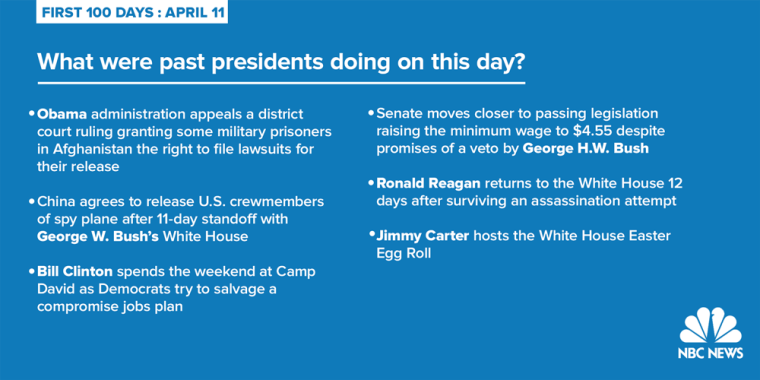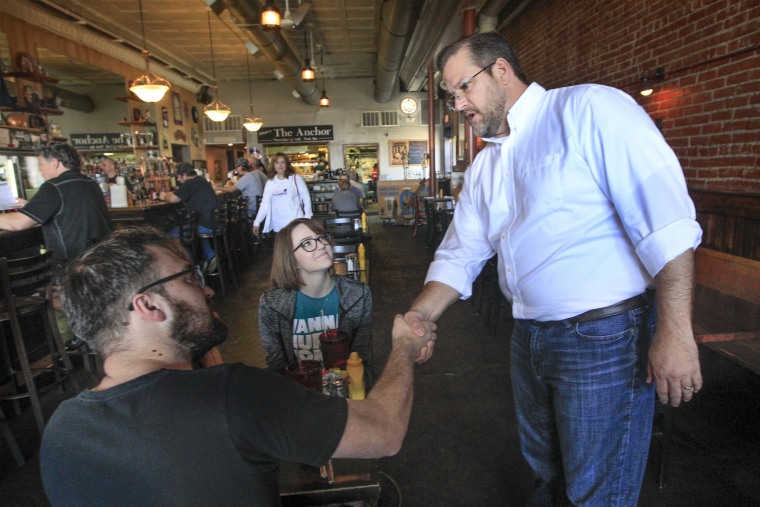First Read is your briefing from Meet the Press and the NBC Political Unit on the day's most important political stories and why they matter
Special elections give Democrats a chance to make a big statement
Voters head to the polls today in Kansas’s Fourth Congressional District in the special House election to replace Rep. Mike Pompeo. Until late last week, this race — in a district that voted for Donald Trump by nearly 30 points — had received sparse national attention, with almost all the political oxygen going to the more competitive Atlanta-area contest looming next week (much more on that below). But since Thursday, the National Republican Congressional Committee has poured cash into a last minute TV ad buy against Democrat James Thompson; Ted Cruz flew in to campaign for GOP State Treasurer Ron Estes; and a Republican super PAC launched robocalls from Vice President Mike Pence and — yesterday — from President Trump himself.
Estes should still be the favorite in this typically ruby-red district, but in a low-turnout election with a fired-up Democratic base and a demoralized Republican one, a close race or even a Thompson win is certainly possible. Even a single-digit loss for Democrats here would be a huge coup for the party, especially ahead of next week’s contest in in Georgia. One important note, though: The Republican enthusiasm gap in Kansas shouldn’t be interpreted as solely a Trump-related problem; GOP Gov. Sam Brownback’s dismal approval ratings in the state have been perhaps the most significant factor weighing Estes down. Polls close at 7 p.m. CT.
And, with a week to go, previewing the Georgia special election
We’re a week out from the special election to replace Tom Price in Georgia’s Sixth Congressional District, a race that’s long been cast as an electoral alarm bell for both parties nationally. On the Democratic side, candidate Jon Ossoff has a chance to demonstrate the strength of the anti-Trump resistance and offer a model for how to harness it — if he can win the contest outright by hitting the 50 percent mark on Tuesday (or, in a heavier lift, if he can ultimately prevail in a less divided field in a potential June runoff.) On the Republican side, an eked-out win against an energized Democratic base could jar dispirited Republicans into setting aside their divisions.
What to keep in mind about GA-06
The race is getting a ton of outside money and press attention, and rightfully so. But there are also a few dynamics here that shouldn’t be ignored in the search for national symbolism.
- This district’s highly educated and well-to-do suburban voters may have picked outgoing GOP Rep. Tom Price by a comfortable 23 points and voted for Mitt Romney by about the same margin in 2012, but this is not Trump country. In fact, Trump only bested Hillary Clinton here by about a point and a half in November. Trump’s double-digit deficit to Romney’s margins in GA-06 is mirrored inabout two dozen GOP districts nationwide —places that are diverse (think Texas and California), highly-educated (think DC suburbs) or otherwise uniquely skeptical of the president (think Utah). It’s a significant chunk of the GOP landscape, but keep in mind that there are also roughly twice as many GOP districts around the country where Trump was the one beating Romney’s 2012 share by double digits.
- In this “jungle primary,”Ossoff is benefiting now as the standout Democrat in an exceptionally crowded field of 18 candidates, while top Republican contender Karen Handel is being buffeted by attacks from other outspoken Republicans in the race and by attack ads funded by the Club for Growth. If Ossoff doesn’t win outright on Tuesday, a runoff would likely give new life to the sole Republican standard-bearer and make this look a bit more like a typical congressional election.
- Ossoff has raised a record-setting $8.3 million, almost all of it from fired-up out-of-state liberals. But as NBC’s Alex Seitz-Wald writes, Ossoff isn’t ideologically aligned with all of his fans. “The liberals who filled Ossoff's campaign coffers seem to be fine with — or perhaps unaware of the fact — that their anti-Trump hero sounds more like a moderate. It underscores the challenge Democrats face in trying to turn the anti-Trump "resistance" into electoral wins next year. Go too hard on Trump and risk turning off independents and moderate Republicans; go too soft on Trump and risk losing the liberal base.”
Bottom line: The GA-06 results will give us valuable insight into how the two parties are faring in the Trump era right now. A big outright win for Ossoff will – and should — spook the GOP. (It would also be a major recruiting boon for Dems.). But keep the unique circumstances of this race in mind, too. And remember how much the landscape will almost certainly change in the next 19 months — an eternity in electoral politics.
The special elections calendar
Aside from the contests in Kansas and Georgia, there are also more special election contests coming in South Carolina (to replace Mick Mulvaney), Montana (to replace Ryan Zinke) and California (to replace Xavier Becerra). Here’s the full calendar of what’s to come.
- April 11 – Kansas 4th district election
- April 18 – Georgia 6th district – “jungle” primary
- May 2 – South Carolina 5th district primary
- May 16 – South Carolina 5th district runoff
- May 25 – Montana at-large election
- June 6 – California 34th district election
- June 20 – Georgia 6th district runoff
- June 20 – South Carolina 5th district election
Goodbye, Gov. Bentley — and the laws of political gravity
It took more than a year, but the abuse of power/extramarital affair scandal that has embroiled Alabama Gov. Robert Bentley since March 2016 finally brought him down. Bentley’s resignation and guilty plea to two misdemeanor campaign finance violations last night makes him the third Alabama governor in three decades to be felled by a corruption scandal. (It also comes, by the way, after the ousters of both Alabama’s House Speaker and the Chief Justice of the state Supreme Court.) Over the last two years, we occasionally pondered whether the rules that typically govern political outrage were upended for everyone by Donald Trump’s ability to weather controversy after controversy in his rise to the presidency. But despite months of trying to ignore the realities of being caught up in a classically salacious scandal, Bentley found that — yes — the laws of political gravity still applied.
Tillerson heads to Moscow
NBC’s Bill Neely writes that Tillerson’s visit to Moscow today isn’t the meeting that both sides envisioned. “Secretary of State Rex Tillerson, holder of a medal of friendship from Vladimir Putin, had hoped to sit down with avuncular counterpart Sergei Lavrov to discuss Ukraine, NATO, Iran, Syria, sanctions and above all, better relations with Russia. But that's not what's on the table in Moscow. Instead, the agenda is sarin gas, dead children and cruise missiles. And hanging over the talks, the question: "What next?" Neely writes. More: “[T]he mood music isn't good as Tillerson prepares to leave Italy for Moscow Tuesday evening, amid threats of new "red lines" from Russia and Iran over further U.S. strikes. The diplomatic damage from the alleged chemical weapons attack and the U.S. response might yet be contained, but this is not the way either side imagined this first, important meeting.”
Trump’s Day
The president leads a “strategic and policy CEO discussion” at 10:45 a.m. ET. He’ll meet with Homeland Security Secretary John Kelly and then with H.R. McMaster and Gary Cohn in the afternoon, then host a working dinner with military leaders.
What were other presidents doing on April 11?




